By Katherine McGinity · Wednesday, June 20, 2012 As an occasional feature on TELOSscope, we highlight a past Telos article whose critical insights continue to illuminate our thinking and challenge our assumptions. Today, Katherine McGinity looks at Jim Vernon’s “American Antigone: Hegelian Reflections on the Sheehan-Bush Conflict,” from Telos 144 (Fall 2008).
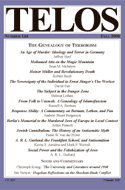 With the departure of the last American troops from Iraq, we can shift our perspective on the war from current event to one of history. Jim Vernon’s 2008 article “American Antigone: Hegelian Reflections on the Sheehan-Bush Conflict” was written in the midst of the war and just as Cindy Sheehan was moving herself out of the public eye. Now is an interesting time to revisit the dramatic conflict that ensued between Sheehan and George W. Bush and the ideological camps that formed around them. With the departure of the last American troops from Iraq, we can shift our perspective on the war from current event to one of history. Jim Vernon’s 2008 article “American Antigone: Hegelian Reflections on the Sheehan-Bush Conflict” was written in the midst of the war and just as Cindy Sheehan was moving herself out of the public eye. Now is an interesting time to revisit the dramatic conflict that ensued between Sheehan and George W. Bush and the ideological camps that formed around them.
Continue reading →
By Wes Tirey · Tuesday, June 19, 2012 The cover of the most recent issue of The Economist reads: “Morals and the machine: Teaching robots right from wrong.” A short piece in the magazine states: “As robots become more autonomous, the notion of computer-controlled machines facing ethical decisions is moving out of the realm of science fiction and into the real world. Society needs to find ways to ensure that they are better equipped to make moral judgments.” Moreover, as robots “become smarter and more widespread, autonomous machines are bound to end up making life-or-death decisions in unpredictable situations, thus assuming—or at least appearing to assume—moral agency.”
Continue reading →
By Russell A. Berman · Monday, June 18, 2012 Telos 159 (Summer 2012) is now available for purchase here.
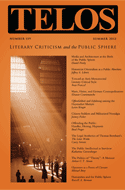 Edna St. Vincent Millay’s famous sonnet “If I should learn, in some quite casual way,” included in her 1917 volume Renascence and Other Poems, stages the harsh collision of private sentiment and public silence, against the backdrop of the mass culture of modernity. Seated in a crowded subway, the speaker glances at the back of a newspaper held by another commuter, only to learn of the death of a loved one, perhaps a lover, the unnamed addressee of the poem. The fact of the apathetic publication of the news underscores, through ironic contrast, the shock and the depth of private affect that cannot be expressed in the public of public transportation: “I should not cry aloud—I could not cry / Aloud, or wring my hands in such a place—” Edna St. Vincent Millay’s famous sonnet “If I should learn, in some quite casual way,” included in her 1917 volume Renascence and Other Poems, stages the harsh collision of private sentiment and public silence, against the backdrop of the mass culture of modernity. Seated in a crowded subway, the speaker glances at the back of a newspaper held by another commuter, only to learn of the death of a loved one, perhaps a lover, the unnamed addressee of the poem. The fact of the apathetic publication of the news underscores, through ironic contrast, the shock and the depth of private affect that cannot be expressed in the public of public transportation: “I should not cry aloud—I could not cry / Aloud, or wring my hands in such a place—”
Continue reading →
By Frederick Wertz · Friday, June 15, 2012 As an occasional feature on TELOSscope, we highlight a past Telos article whose critical insights continue to illuminate our thinking and challenge our assumptions. Today, Frederick Wertz looks at Franklin Adler’s “The Original Model of American Democracy and the Turn to Statism,” from Telos 104 (Summer 1995).
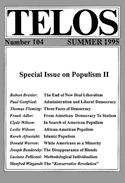 In his well-known visit to the United States, Alexis de Toqueville was particularly struck by the invisibility of the American state: “Nothing strikes a European traveler in the United States more than the absence of what we would call government or administration. One knows that there are written laws there and sees them put into execution every day; everything is in motion around you, but the motive force is nowhere apparent.” At the time of his visit, the state governments of Europe were indeed gargantuan compared to that of the newly founded state across the pond. While such a gap used to be the main distinguishing characteristic between governments of the old world and new, few would disagree that today this gap has closed significantly. For better or worse, the government of the United States has taken a decidedly statist turn from its original model. In his well-known visit to the United States, Alexis de Toqueville was particularly struck by the invisibility of the American state: “Nothing strikes a European traveler in the United States more than the absence of what we would call government or administration. One knows that there are written laws there and sees them put into execution every day; everything is in motion around you, but the motive force is nowhere apparent.” At the time of his visit, the state governments of Europe were indeed gargantuan compared to that of the newly founded state across the pond. While such a gap used to be the main distinguishing characteristic between governments of the old world and new, few would disagree that today this gap has closed significantly. For better or worse, the government of the United States has taken a decidedly statist turn from its original model.
Continue reading →
By Wes Tirey · Thursday, June 14, 2012 As an occasional feature on TELOSscope, we highlight a past Telos article whose critical insights continue to illuminate our thinking and challenge our assumptions. Today, Wes Tirey looks at Alain de Benoist’s “Democracy Revisited,” from Telos 95 (Spring 1993).
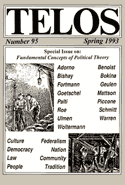 In his book Radical Democracy, C. Douglas Lummis writes that democracy is a “whore among political words.” Indeed, anyone who sees the ideals of inclusionary dialogue and autonomy that democracy is supposed to represent juxtaposed with the “democratic” endeavors of certain political actors knows quite well that democracy and its meaning are in desperate need to be revisited. Alain de Benoist does just that in his article “Democracy Revisited.” In his book Radical Democracy, C. Douglas Lummis writes that democracy is a “whore among political words.” Indeed, anyone who sees the ideals of inclusionary dialogue and autonomy that democracy is supposed to represent juxtaposed with the “democratic” endeavors of certain political actors knows quite well that democracy and its meaning are in desperate need to be revisited. Alain de Benoist does just that in his article “Democracy Revisited.”
Continue reading →
By Telos Press · Wednesday, June 13, 2012 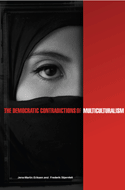 Jens-Martin Eriksen and Frederik Stjernfelt’s The Democratic Contradictions of Multiculturalism, now available from Telos Press, explores the fundamental conceptions and political implications of culturalism and multiculturalism. “Multiculturalism” is a term that is used often in mainstream discourse, although its meaning usually goes unquestioned or unchallenged. For Eriksen and Stjernfelt, multiculturalism is either “soft” or “hard.” Soft multiculturalism allows the individual to express his or her cultural identity: it is “a system where the individual can choose to live in whatever way she or he wishes.” Hard multiculturalism, however, describes a community that uses legal and social tools to reproduce and regulate its own values; moreover, “the community may even mobilize its own police force and legal system in order to demand, to some extent or another, the conformity of individuals.” Jens-Martin Eriksen and Frederik Stjernfelt’s The Democratic Contradictions of Multiculturalism, now available from Telos Press, explores the fundamental conceptions and political implications of culturalism and multiculturalism. “Multiculturalism” is a term that is used often in mainstream discourse, although its meaning usually goes unquestioned or unchallenged. For Eriksen and Stjernfelt, multiculturalism is either “soft” or “hard.” Soft multiculturalism allows the individual to express his or her cultural identity: it is “a system where the individual can choose to live in whatever way she or he wishes.” Hard multiculturalism, however, describes a community that uses legal and social tools to reproduce and regulate its own values; moreover, “the community may even mobilize its own police force and legal system in order to demand, to some extent or another, the conformity of individuals.”
Continue reading →
|
|
 With the departure of the last American troops from Iraq, we can shift our perspective on the war from current event to one of history. Jim Vernon’s 2008 article “American Antigone: Hegelian Reflections on the Sheehan-Bush Conflict” was written in the midst of the war and just as Cindy Sheehan was moving herself out of the public eye. Now is an interesting time to revisit the dramatic conflict that ensued between Sheehan and George W. Bush and the ideological camps that formed around them.
With the departure of the last American troops from Iraq, we can shift our perspective on the war from current event to one of history. Jim Vernon’s 2008 article “American Antigone: Hegelian Reflections on the Sheehan-Bush Conflict” was written in the midst of the war and just as Cindy Sheehan was moving herself out of the public eye. Now is an interesting time to revisit the dramatic conflict that ensued between Sheehan and George W. Bush and the ideological camps that formed around them.  Edna St. Vincent Millay’s famous sonnet “If I should learn, in some quite casual way,” included in her 1917 volume Renascence and Other Poems, stages the harsh collision of private sentiment and public silence, against the backdrop of the mass culture of modernity. Seated in a crowded subway, the speaker glances at the back of a newspaper held by another commuter, only to learn of the death of a loved one, perhaps a lover, the unnamed addressee of the poem. The fact of the apathetic publication of the news underscores, through ironic contrast, the shock and the depth of private affect that cannot be expressed in the public of public transportation: “I should not cry aloud—I could not cry / Aloud, or wring my hands in such a place—”
Edna St. Vincent Millay’s famous sonnet “If I should learn, in some quite casual way,” included in her 1917 volume Renascence and Other Poems, stages the harsh collision of private sentiment and public silence, against the backdrop of the mass culture of modernity. Seated in a crowded subway, the speaker glances at the back of a newspaper held by another commuter, only to learn of the death of a loved one, perhaps a lover, the unnamed addressee of the poem. The fact of the apathetic publication of the news underscores, through ironic contrast, the shock and the depth of private affect that cannot be expressed in the public of public transportation: “I should not cry aloud—I could not cry / Aloud, or wring my hands in such a place—”  In his well-known visit to the United States, Alexis de Toqueville was particularly struck by the invisibility of the American state: “Nothing strikes a European traveler in the United States more than the absence of what we would call government or administration. One knows that there are written laws there and sees them put into execution every day; everything is in motion around you, but the motive force is nowhere apparent.” At the time of his visit, the state governments of Europe were indeed gargantuan compared to that of the newly founded state across the pond. While such a gap used to be the main distinguishing characteristic between governments of the old world and new, few would disagree that today this gap has closed significantly. For better or worse, the government of the United States has taken a decidedly statist turn from its original model.
In his well-known visit to the United States, Alexis de Toqueville was particularly struck by the invisibility of the American state: “Nothing strikes a European traveler in the United States more than the absence of what we would call government or administration. One knows that there are written laws there and sees them put into execution every day; everything is in motion around you, but the motive force is nowhere apparent.” At the time of his visit, the state governments of Europe were indeed gargantuan compared to that of the newly founded state across the pond. While such a gap used to be the main distinguishing characteristic between governments of the old world and new, few would disagree that today this gap has closed significantly. For better or worse, the government of the United States has taken a decidedly statist turn from its original model.  In his book Radical Democracy, C. Douglas Lummis writes that democracy is a “whore among political words.” Indeed, anyone who sees the ideals of inclusionary dialogue and autonomy that democracy is supposed to represent juxtaposed with the “democratic” endeavors of certain political actors knows quite well that democracy and its meaning are in desperate need to be revisited. Alain de Benoist does just that in his article “Democracy Revisited.”
In his book Radical Democracy, C. Douglas Lummis writes that democracy is a “whore among political words.” Indeed, anyone who sees the ideals of inclusionary dialogue and autonomy that democracy is supposed to represent juxtaposed with the “democratic” endeavors of certain political actors knows quite well that democracy and its meaning are in desperate need to be revisited. Alain de Benoist does just that in his article “Democracy Revisited.”  Jens-Martin Eriksen and Frederik Stjernfelt’s The Democratic Contradictions of Multiculturalism,
Jens-Martin Eriksen and Frederik Stjernfelt’s The Democratic Contradictions of Multiculturalism, 

